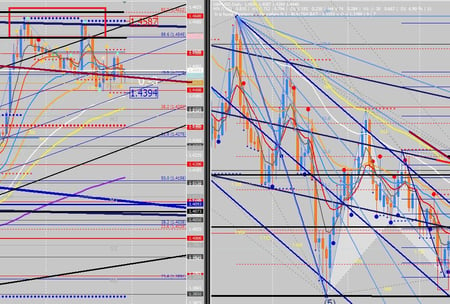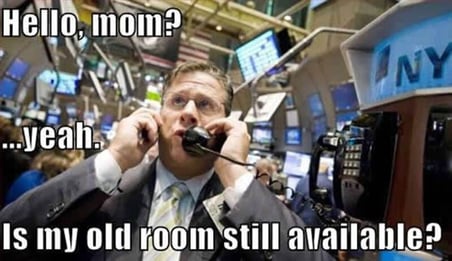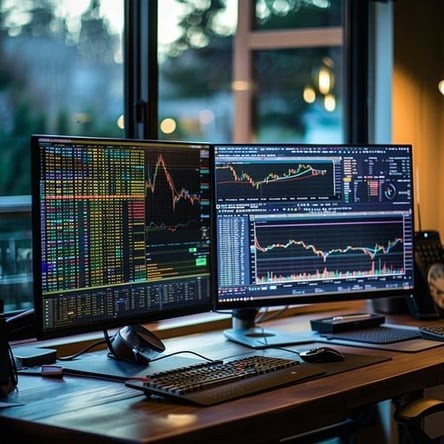Why do 90-95% of traders fail?
Why do 90-95% of traders fail?
- 90-95% of people fail to come to trading. These are often clever people, lawyers, mathematicians or people with experience in finance already. There are almost no other industry I can think of, apart from elite selection (such as Olympic or elite military selection) that has such a high failure rate. You only have a choice of choosing whether the market is going to go up or down. Yet almost everyone fails. So clearly there is something going on. What are the 5% of winners doing, that the 95% are not?
The answer is they do everything much better.
1) Retail traders trade with the wrong strategy and tools from the very beginning. They all use the same types of strategies, methodology and approaches, obtained from internet forums such as Forex Factory. Retail traders all use the same tools and indicators as other traders who fail ....so they all fail together, just at different speeds. The gurus go on to create their own website and sell a trading course which is just a variation of the same thing that did not work the first time. The indicators they use on their charts do not predict price like they think, but are just an alternative representation of price expressed mathematically on the same chart. Because they don´t know how to read the markets in real time, they sometimes go for a set and forget approach, usually in the form of pending orders and 2:1 targets where everything is pre-loaded into the trade beforehand. The reality is that all these “great“ strategies have a 90-95% failure rate according to broker´s data.
= A professional trader will only use indicators and tools that provide a statistical edge in the market, many of which require an advanced level of understanding or are not commercially because they are developed individually. They focus on how to get into trades that have a good risk structure and look at the usefulness of market structure as a good way of controlling risk. If price goes my way I will get out here... If price goes against me I get out here. Professionals also are responsive when in a trade, and are constantly re-evaluating the odds of success. They will get out of trades or reduce the risk if there is a weak reaction and price seems unlikely to go much further.
2) Retail traders speculate. Retail traders frame trading the wrong way because they focus heavily on predicting price. Retail traders project what they think will happen onto the market. They say if price comes back to a support area, or moving average.. price will go up. - Professional traders by contrast have a reactive approach to trading, rather than predictive trading. Decisions are not based on what they think the market WILL do. Professional traders let the market tell them where it is going to go before entering. Decisions are based on what the price IS telling them.. waiting for the price to tell them whether to buy or sell which means getting later into a trade but in a more reliable way. A professional trades specific market behaviour. They will examine hundreds of examples of what happens when price hit a certain area or level (in the past) and use this data to trade (the future). So when they are trading they not really predicting the future, more just trading the odds of price behaviour. Professionals do not try to predict what the market is going to do, but rely on their journal of scenarios to tell them what to do. Every decision is dictated to them by prior scenarios and data collection around a specific set up of how price moves on that pair
3) Retail traders have a generic approach to trading and try to do too much.They trade many currency pairs, strategies, set ups and timeframes all the same time. They focus on the upside to the account, rather than drawdown and are unable to control risk as a result. They think for it to be a good strategy it must "work" across all currency pairs and timeframes. But the reality is all pairs behave differently.. so all the details and nuances are missing compared to if they were to just focus solely one or two currency pairs and gain a deep understanding of those. . . = A professional trader will only trade one or two different markets in an ultra specific way, learning everything about that one market on detail so they can trade and control risk at the same time.
4) Retail traders focus on win rate, and seek to trade in a very precise way, with tight parameters They like to use very tight stop losses and trade from exact levels with very high risk reward. Many move to breakeven as soon as possible to protect their trade. All this sounds great, but it is not how the Forex markets work in reality. The end result is retail traders normally get stopped out many times in a row because their stop loss is too near, and then miss the move they were trying to capture. Professional traders trade with wider stop losses so they are more tolerant to the market and normally end up catching the move. Professional traders mark key levels on their charts but its a more flexible approach with no pre-assumptions made in advance. They wait until price gets back there before making decisions about the strength of the level and look at how price is interacting at the level before making decisions. The translates into the market as normally getting later into the price move but in a more reliable way.
5) Retail traders have very complex strategies. They make their trading so complex, always looking at different strategies, timeframes and information thinking it will help them. Because they don’t understand why their trades fail, retail traders add more and more rules and indicators such that they cannot even follow their own strategy because it no longer makes sense, even to them. They think the more they read about trading the more informed they will become. They don't know where to turn and study more and more strategies and trading approaches not realizing they are going in circles and will never be successful this way. Its not their fault, its just the realities of learning to trade. Professional trader keep things very simple, repeatable and control risk. They entire focus is on consistency, simplicity and repeatability. They focus on the process and following their strategy rather than being concerned with the outcome of a particular trade, or a particular days performance. They do not to see bad days as failures, even in the moment but they follow their strategy because they know losses are just part of the game and they will win overall. Every decision is already data tested. Each trading day the focus is on trade execution according to their strategy. If the trade failed, but they followed their rules.. they reward themselves.
6) Traders who fail are unable to follow their strategy. They are normally incapable of taking multiple trades in a row following the exact rules of their strategy. They simply can´t follow their plan because their emotional brain overrides it on every single trade. So after a few losses, they blame the strategy and go searching for another. - Professional traders have a strategy that works and they go all on it with complete tunnel vision. A successful trader is a restricted trader. They don´t mess around looking at other strategies, or compete with other traders as to whose is the best strategy. They understand that the key is consistency and journaling processes to refine all aspects of their approach for constant improvement, not jumping onto someone else´s strategy after a few losses If there is a new scenario not seen before within their specific strategy, the trade is not taken but rather recorded and analysed for the future. Many professional traders do not read anything to do with trading or look at other peoples courses. They understand that trading is about putting in the hard work within one approach, to understand it at a deep level. They simply focus on their own approach and psychology in order to systematically to stay with their own strategy.
7) Retail traders have an unrealistic expectations of what profitable trading actually looks like, because they obtained theirs from internet forums and YouTube. They think that its possible to learn to trade in 1 year and turn 100 into 10,000. They think it is possible to trade with almost no losses. They see their trading account like a cash point, when they need money turn on the computer and trade. That their trading account will be almost always making new account highs so they are happy to risk 5-10% of their account each trade. They think all professional traders drive Ferraris, and trade one hour each day from their mobile phone or a laptop at the beach. The reality is it takes most traders 3-6 years hard work to even become consistently profitable, and a further 1-2 more years after that to have the confidence and account size to consider becoming professional. So it is a journey of 6-8 years, like to become a lawyer or doctor. It is also normal to experience periods of drawdown where the account balance goes backwards for a period of time. A large hedge fund is looking for just 1-2 % gain each month, risking perhaps 0.1% to 0.25% of their account each trade. A private independent trader should be risking 0.25% to 2% each trade for a 3 to 5% gain each month on their account.








Learn to Trade
Master EUR/USD trading
CONTACT
Email:
Mobile: 003
© 2022. All rights reserved.


